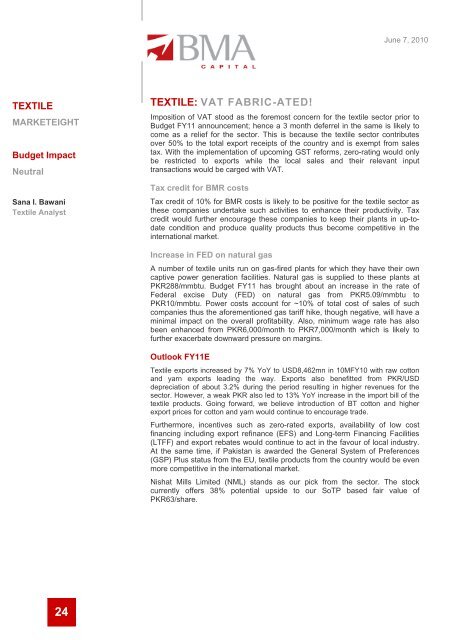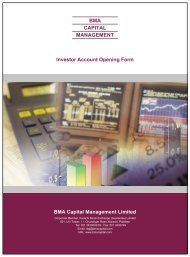omc: no mention; hence safe - BMA Capital Management
omc: no mention; hence safe - BMA Capital Management
omc: no mention; hence safe - BMA Capital Management
You also want an ePaper? Increase the reach of your titles
YUMPU automatically turns print PDFs into web optimized ePapers that Google loves.
TEXTILE<br />
MARKETEIGHT<br />
Budget Impact<br />
Neutral<br />
Sana I. Bawani<br />
Textile Analyst<br />
24<br />
TEXTILE: VAT FABRIC-ATED!<br />
June 7, 2010<br />
Imposition of VAT stood as the foremost concern for the textile sector prior to<br />
Budget FY11 an<strong>no</strong>uncement; <strong>hence</strong> a 3 month deferrel in the same is likely to<br />
come as a relief for the sector. This is because the textile sector contributes<br />
over 50% to the total export receipts of the country and is exempt from sales<br />
tax. With the implementation of upcoming GST reforms, zero-rating would only<br />
be restricted to exports while the local sales and their relevant input<br />
transactions would be carged with VAT.<br />
Tax credit for BMR costs<br />
Tax credit of 10% for BMR costs is likely to be positive for the textile sector as<br />
these companies undertake such activities to enhance their productivity. Tax<br />
credit would further encourage these companies to keep their plants in up-todate<br />
condition and produce quality products thus become competitive in the<br />
international market.<br />
Increase in FED on natural gas<br />
A number of textile units run on gas-fired plants for which they have their own<br />
captive power generation facilities. Natural gas is supplied to these plants at<br />
PKR288/mmbtu. Budget FY11 has brought about an increase in the rate of<br />
Federal excise Duty (FED) on natural gas from PKR5.09/mmbtu to<br />
PKR10/mmbtu. Power costs account for ~10% of total cost of sales of such<br />
companies thus the afore<strong>mention</strong>ed gas tariff hike, though negative, will have a<br />
minimal impact on the overall profitability. Also, minimum wage rate has also<br />
been enhanced from PKR6,000/month to PKR7,000/month which is likely to<br />
further exacerbate downward pressure on margins.<br />
Outlook FY11E<br />
Textile exports increased by 7% YoY to USD8,462mn in 10MFY10 with raw cotton<br />
and yarn exports leading the way. Exports also benefitted from PKR/USD<br />
depreciation of about 3.2% during the period resulting in higher revenues for the<br />
sector. However, a weak PKR also led to 13% YoY increase in the import bill of the<br />
textile products. Going forward, we believe introduction of BT cotton and higher<br />
export prices for cotton and yarn would continue to encourage trade.<br />
Furthermore, incentives such as zero-rated exports, availability of low cost<br />
financing including export refinance (EFS) and Long-term Financing Facilities<br />
(LTFF) and export rebates would continue to act in the favour of local industry.<br />
At the same time, if Pakistan is awarded the General System of Preferences<br />
(GSP) Plus status from the EU, textile products from the country would be even<br />
more competitive in the international market.<br />
Nishat Mills Limited (NML) stands as our pick from the sector. The stock<br />
currently offers 38% potential upside to our SoTP based fair value of<br />
PKR63/share.



